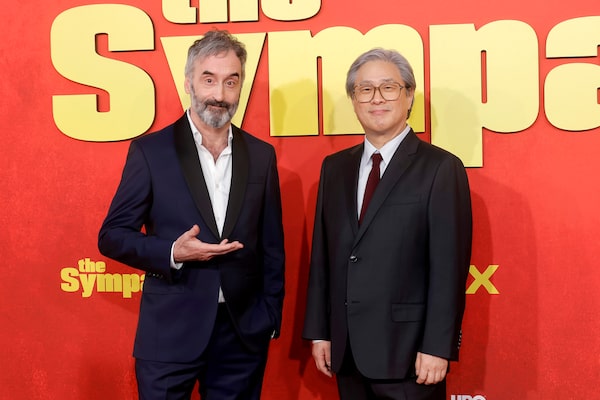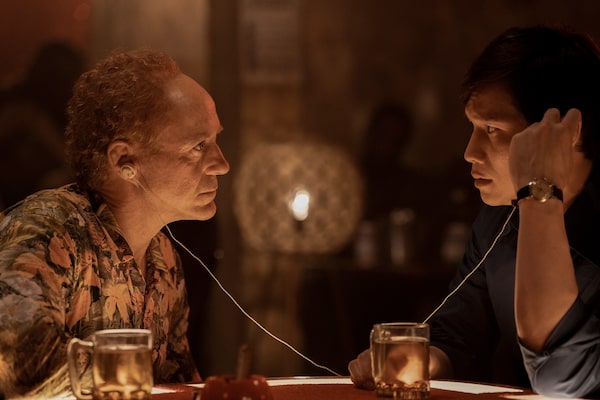
LOS ANGELES, CALIFORNIA - APRIL 09: (L-R) Don McKellar, left, and Park Chan-wook attend the Los Angeles Premiere of HBO Original Limited Series The Sympathizer at The Paramount LA on April 9 in Los Angeles.Emma McIntyre/Getty Images
“I am a spy, a sleeper, a spook, a man of two faces.”
The opening line of The Sympathizer by Viet Thanh Nguyen – the 2015 Pulitzer Prize winner about a Vietcong double agent acting as a mole within a South Vietnamese refugee community in Los Angeles – is certainly a contender for one of the most compelling of this century’s cloak-and-dagger literature.
The Captain, the novel’s half-Vietnamese, half-French anti-hero and narrator, gets out on one of the last flights during of the fall of Saigon – and ends up on a disorienting mission that sees him rewriting lines for Vietcong characters in a Hollywood film one moment, then figuring out how to thwart exiles planning a delusional guerrilla return to Vietnam the next.
His ability “to see any issue from both sides” is a virtue that he slowly realizes is a danger to himself, as well as others.
It only makes thematic sense, then, to get a duo to tackle a television adaptation of The Sympathizer – itself half spy thriller, half migration odyssey – and capture its increasingly dizzying depiction of cultural duality.
But who would have guessed the right pair would be Canadian filmmaker and screenwriter Don McKellar and South Korean filmmaker Park Chan-wook?
On Sunday, their seven-episode series lands on HBO (and on Crave) in the prime slot that’s previously been home to critical catnip such as Succession, The White Lotus and Game of Thrones – and demonstrates how television auteurism can be a game for two.
“We are the showrunner with two faces,” declares McKellar, with no lack of irony, in an interview over Zoom from Los Angeles. “We are the Eastern and Western synthesis.”
Park, meanwhile, has a different assessment of how the twain met in The Sympathizer – which he expresses in the stereotypical language that a fictional American academic uses when discussing the Captain’s supposedly active “Occidental” and passive “Oriental” psychological qualities in the book and series.
“Don is not someone who is very stubborn about his arguments and, in terms of the North American paradigm, he has a tendency to lean more towards the sort of Oriental side,” Park says, in a Zoom interview from Seoul, translated into English by L.A.-based interpreter Jaehuen Chung who played a big role in running the show.
“This is how us Korean people [working on The Sympathizer] felt. … We would say there were two Orientals in this duo.”
When I relay Park’s comment back to McKellar, the Canadian bursts into laughter. “I’m sort of complimented, but I don’t know why,” he says. “I thought I pushed very hard, in an Asian way!”
Talking to the showrunners, back and forth on opposite sides of the world, is not far off from the ping-pong diplomacy of how The Sympathizer was written at times. Chung – himself acting as a kind of double agent – translated Park’s scripts from Korean to English for McKellar, who would then do his own passes and send them back.
“We went through this cycle many, many times,” says Park, who reads and understands English but expresses himself best in Korean. “But once you get the hang of it, the pace picks up.”
The two men, who turned 60 just days after one another last summer, may not share a mother tongue but it is clear that they share a love of irony and a certain type of dark comedy. Both these qualities align with the sardonic voice of Nguyen’s novel that they felt was key to keeping alive in their television adaptation.
The story is told in the voice of the Captain (Vietnamese-Australian actor Hoa Xuande plays the role) as he writes and rewrites a confession in a Communist re-education camp. He constantly makes the reader cackle with his deadpan depictions of the absurd Catch-22s of war and exile and life as a minority in the United States; then, once you’ve let down your guard, he delivers emotional gut punches with his description of the plot’s sometimes gruesome human drama.
This is captured in both the dialogue in the HBO series – which liberally quotes some of Nguyen’s most underline-able passages – and in offbeat visuals such as the smiling logo of an American fast-food chain called Happy Burger that reappears over and over in disturbing moments.
The cast of The Sympathizer is largely Vietnamese, including a number of Canadians from that country’s diaspora, such as series stand-out Fred Nguyen Khan as the Captain’s brother-in-arms/ideological enemy Bon. (Sandra Oh, the Korean-Canadian star and McKellar’s long-time friend and collaborator, is in the series too – playing the Captain’s lover in the U.S., Ms. Mori.)

Robert Downey Jr. and Hoa Xuande in The SympathizerHBO / Crave
But the big aesthetic swing in terms of casting by The Sympathizer’s Canadian/Korean show-running team was having (now freshly minted Oscar winner) Robert Downey Jr. play multiple characters – from a professor of Oriental studies, to a CIA agent, to a macho filmmaker who thinks he’s countercultural.
The American star’s casting is not just an homage to Peter Sellers in Dr. Strangelove (and a wry joke about reverse racism, and white people looking alike), but a comment on how different pillars of the American establishment are complicit with one another, says McKellar.
McKellar and Park were not match-made for The Sympathizer; their artistic relationship well predates the show.
Of course, McKellar is one of Canada’s best-known-in-Canada-only actors, directors and screenwriters – whose eclectic oeuvre includes some of the best dark comedy on Canadian television from Twitch City to Michael: Every Day.
Park, meanwhile, is one of Korea’s greatest directors – perhaps best known for his 2003 film Oldboy, a dazzlingly violent yet thoughtful revenge tragedy that won the Grand Prix prize at Cannes Film Festival. His work continues to be celebrated at Cannes, where his 2022 neo-noir Decision to Leave netted him the best director prize, but hasn’t quite had the full Academy Award breakthrough yet of his colleague Bong Joon-ho.
The two artists, whose work looks at American culture from an outsider’s point of view, were first paired close to a decade ago on what was planned as a Toronto-set film adaptation of The Ax, Donald E. Westlake’s novel about a downsized manager who goes on a rampage-seeking revenge. Park came and lived in Toronto for a month to work with McKellar on that screenplay – during which time, the latter introduced him to producer Niv Fichman of Rhombus Media.
When Rhombus and co-producer A24 landed the rights to adapt The Sympathizer, author Nguyen expressed that Park was his dream director. Fichman then invited McKellar out for drinks and gave him the book; the Canadian was initially skeptical about taking part in the adaptation until he read it and connected with it on a personal level.
That connection relates in part to McKellar’s grandmother, who was born in China to what he calls “actual missionary stock” – and his own youth where he read Chinese communist texts in Toronto much to his parents’ dismay. But it’s also that for McKellar, as for Park, the period in which the book is set is that of his youth. “That sort of strange, broiling stew of mid-seventies culture and politics was definitely where I came into the picture,” he says.
In Canada, of course, the Vietnam War is a strange source of pride in that our military did not directly participate. But there is no similar sense of detachment in South Korea, where South Koreans participated both directly and indirectly at the behest of the United States. “For Korean people, it is not someone else’s business,” explains Park.
Park, however, found no large disagreement in perspective working with McKellar on translating Nguyen’s narrative-changing book about that war to the small screen. It was a chance to reunite an artistic relationship and friendship – but ultimately there was one thing that made him feel they were the right partners for the project.
“Even if you’re really friendly with each other, and really close to each other, it’s hard to match in terms of sense of humour,” he says. “I daresay we were in sync in terms of our sense of humour.”
 J. Kelly Nestruck
J. Kelly Nestruck